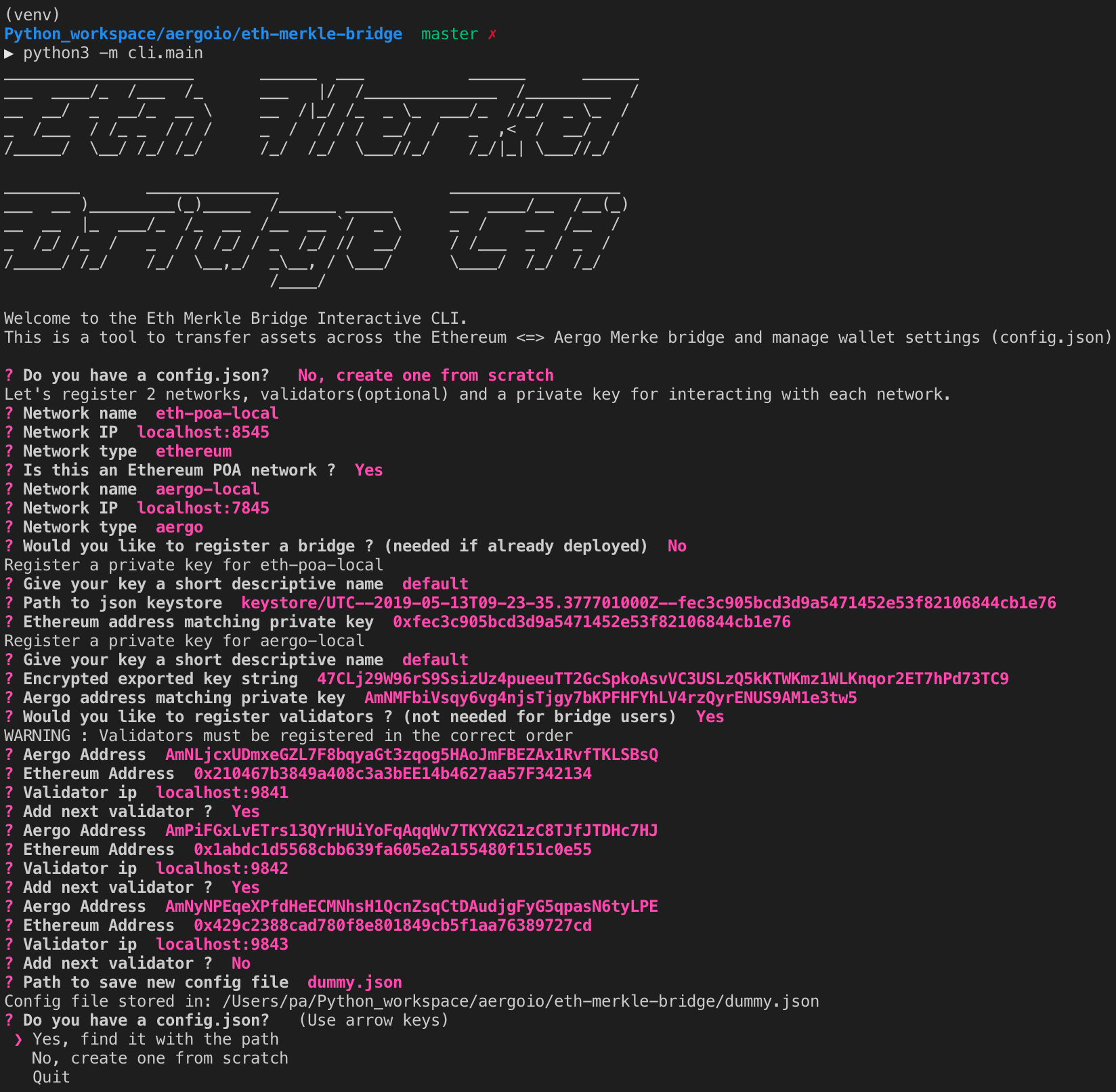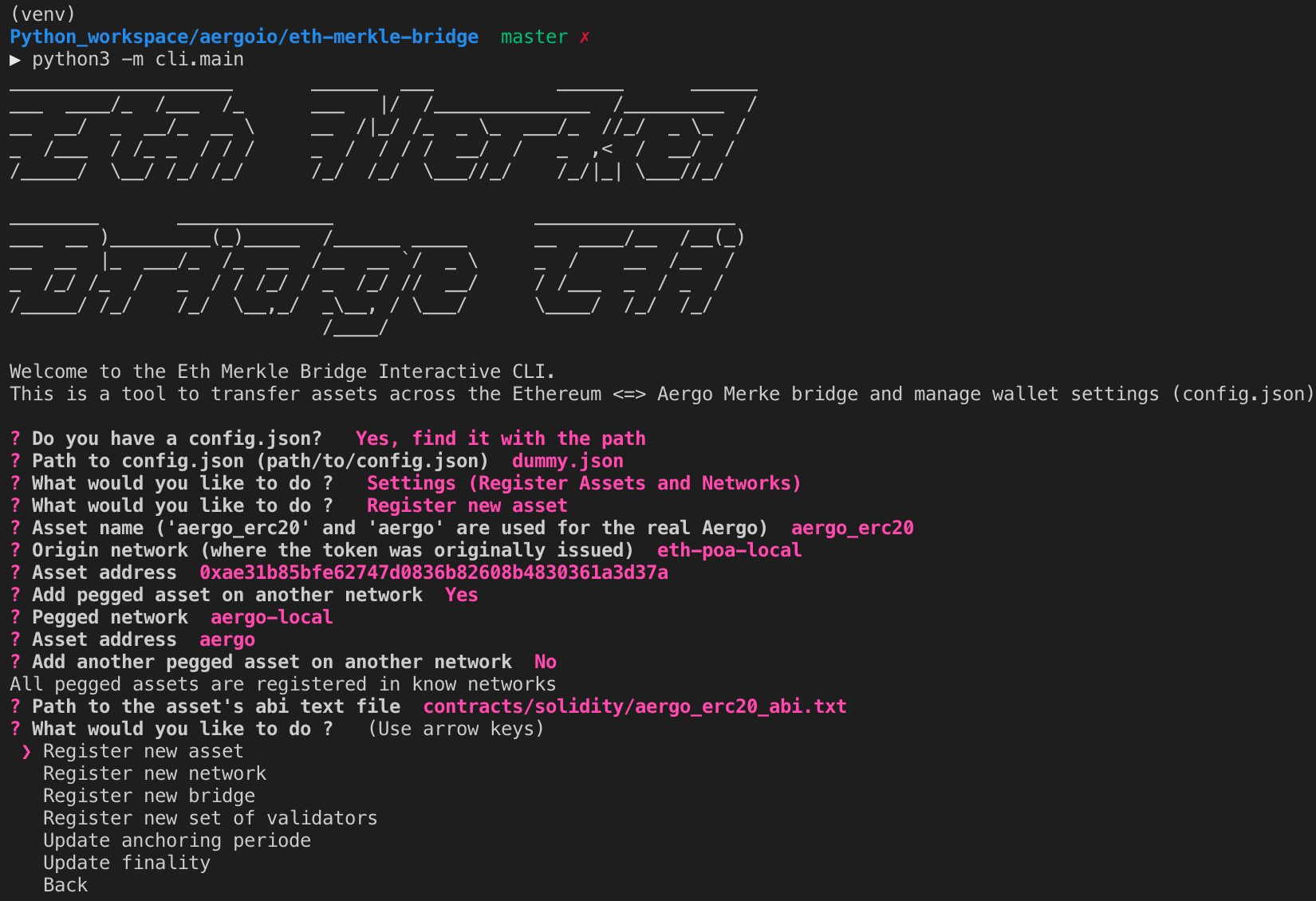Deploying a new bridge¶
Before using the bridge deployer, a config file should be created to register network node connections, bridge tempo (anchoring periode and finality of both chains), validators and the address of aergo_erc20 on ethereum. The aergo bridge contract must record the aergo_erc20 so that aergo can be unfroozen.


$ python3 -m ethaergo_bridge_operator.bridge_deployer --help 18h17m ⚑ ◒
usage: bridge_deployer.py [-h] -c CONFIG_FILE_PATH -a AERGO -e ETH
[--privkey_name PRIVKEY_NAME] [--local_test]
Deploy bridge contracts between Ethereum and Aergo.
optional arguments:
-h, --help show this help message and exit
-c CONFIG_FILE_PATH, --config_file_path CONFIG_FILE_PATH
Path to config.json
-a AERGO, --aergo AERGO
Name of Aergo network in config file
-e ETH, --eth ETH Name of Ethereum network in config file
--privkey_name PRIVKEY_NAME
Name of account in config file to sign anchors
--local_test Start proposer with password for testing
$ python3 -m ethaergo_bridge_operator.bridge_deployer -c './test_config.json' -a 'aergo-local' -e eth-poa-local --t_anchor_aergo 6 --t_final_aergo 4 --t_anchor_eth 7 --t_final_eth 5 --privkey_name "proposer"
------ DEPLOY BRIDGE BETWEEN Aergo & Ethereum -----------
------ Connect AERGO -----------
------ Connect Web3 -----------
------ Set Sender Account -----------
Decrypt Aergo private key 'proposer'
Password:
> Sender Address Aergo: AmPxVdu993eosN3UjnPDdN3wb7TNbHeiHDvn2dvZUcH8KXDK3RLU
> Sender Address Ethereum: 0xc19b69591141443676a3EE56fbf1d3EA869d53D8
aergo validators : ['AmNLjcxUDmxeGZL7F8bqyaGt3zqog5HAoJmFBEZAx1RvfTKLSBsQ', 'AmNLjcxUDmxeGZL7F8bqyaGt3zqog5HAoJmFBEZAx1RvfTKLSBsQ', 'AmNLjcxUDmxeGZL7F8bqyaGt3zqog5HAoJmFBEZAx1RvfTKLSBsQ']
ethereum validators : ['0x210467b3849a408c3a3bEE14b4627aa57F342134', '0x210467b3849a408c3a3bEE14b4627aa57F342134', '0x210467b3849a408c3a3bEE14b4627aa57F342134']
------ Deploy Aergo SC -----------
> result[Cq8C52DBbfUzumGEtAZ163UQrtfuCKE2ovgawTwLk4zq] : TX_OK
------ Deploy Ethereum SC -----------
> SC Address Ethereum: 0x89eD1D1C145F6bF3A7e62d2B8eB0e1Bf15Cb2374
> SC Address Aergo: AmgQqVWX3JADRBEVkVCM4CyWdoeXuumeYGGJJxEeoAukRC26hxmw
------ Store bridge addresses in test_config.json -----------
After deployment, the aer on the Aergo network should be sent (frozen) to the bridge contract so that it can be unfrozen when users sent their erc20 from the ethereum network.